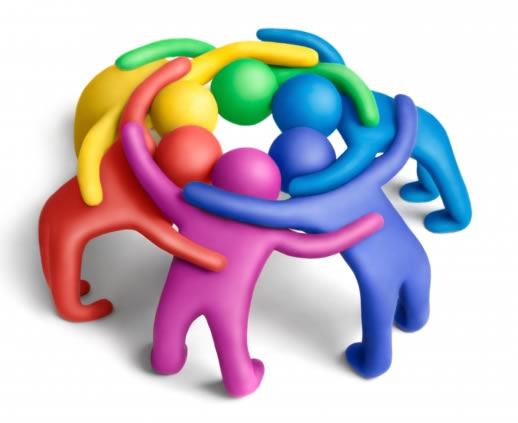Lesson 13: Social Services, Entitlements, and Community Resources
Attention

Learning Outcomes
Upon completion of this lesson's material, students will be able to:
- Understand basic social services and entitlements
- Knowledgeable of generic community resources including natural supports
Teaching
Welfare and Entitlements
Working in CM means that you are going to be working in the world of benefits, government programs, and welfare...there is no way around that. For many of us this presents some challenges in understanding issues such as welfare, entitlements, culture of poverty, etc.
Many of us may have strong attitudes and opinions about welfare, entitlements, and the government. We need to discuss how these programs work.
- Welfare
- Welfare is a generic term that refers to any service or benefit that a person can receive but have not directly or indirectly paid for it.
- Examples of welfare include:
- Supplemental Security Income
- Food Stamps
- General Assistance
- Heating Assistance
- Medicaid (MaineCare)
- College Financial Aid
- Police, Fire, and other Safety Services
- Public Schools
- Eligibility can come and go based on financial criteria.
- Entitlements
- Entitlements is a generic term that refers to any service or benefit that a person can receive and they have directly or indirectly paid for it.
- Examples of entitlements include:
- Pay Checks
- Health Insurance
- Private Schools
- Social Security (SS) and Social Security Disability Income (SSDI)
- Medicare
- Not as subject to eligibility criteria.
Ethical Considerations
Through your work as a CM you may come across a number of ethical dilemmas regarding your work with both welfare and entitlements.
- Establishing benefits for individuals whom you think are not really "eligible"
- Focusing your daily time management on "billable hours"
- Finding "loopholes" in the "system" for individuals who have need, but might not meet specific "eligibility criteria"
- Participating in a system that is largely publically funded, entails larger government structure, and is highly socialized
- Role conflict in regard to your obligations to your boss, your client, the public welfare, and your own values
Natural Supports
For many reasons some of the best resources that we have to assist our clients in meeting their goals are the same resources that EVERYONE uses to reach these goals.
The benefits of these types of resources are as follows:
- Publically available
- Funding is less volatile
- Service is "normalizing" (i.e. less stigma associated with participation)
- Increased community integration
Examples of Natural Supports might include:
- Accomplishing fitness goals at the YMCA
- Accomplishing finance management goals using the services at a bank
- Accomplishing skill development goals at Adult Education, Trade School, or Community College
- Accomplishing career development at the Career Center
- Accomplishing health and weight management goals through Weight Watchers
- Accomplishing socialization and/or spiritual goals at a local church
Click HERE to read Enhancing Recovery through linkage with Indigenous Natural Supports by John B. Allen Jr.
Review the information found at the Maine Department of Health and Human Services on programs and services.
Here is a link to the information:
http://www.maine.gov/dhhs/programs.shtml
Assessment
Possible Class Discussion
Part of your reading is the article titled: "Enhancing Recovery through linkage with Indigenous Natural Supports" by John B. Allen Jr.
Discuss the natural support that is most important in your life.
- Where do you find a sense of community?
- How did you develop that sense of community?
- How can you help clients find that same sense of belongingness, if they do not have it now?
Lesson 13 Quiz
For each of the following scenarios cite ONE potential resource for addressing this problem through a service listed on the www.maine.gov site listed above (or from a mental health service you are familiar with).
You will also provide ONE potential resource for addressing this SAME problem from a natural support. In this case we are focused on any resource that is not SPECIFIC to the mental health population.
- Janice is 67 and has depression. She would like to learn a new hobby take for personal enrichment. (MH Support)
- Janice is 67 and has depression. She would like to learn a new hobby take for personal enrichment. (Natural Support)
- Marie comes to you for help with her son, Tim. He is 5 years old and is becoming difficult to manage behaviorally at home and in day care. He has not yet started kindergarten. (MH Support)
- Marie comes to you for help with her son, Tim. He is 5 years old and is becoming difficult to manage behaviorally at home and in day care. He has not yet started kindergarten. (Natural Support)
- Bethany comes to you in need of food and housing. She has lost her job and apartment and is estranged from her family. She has three children. (MH Support)
- Bethany comes to you in need of food and housing. She has lost her job and apartment and is estranged from her family. She has three children. (Natural Support)
- Thomas has had difficulty making his own meals since his wife passed away last year. He is 75, of limited means and has no family who can bring him meals on a regular basis. (MH Support)
- Thomas has had difficulty making his own meals since his wife passed away last year. He is 75, of limited means and has no family who can bring him meals on a regular basis. (Natural Support)